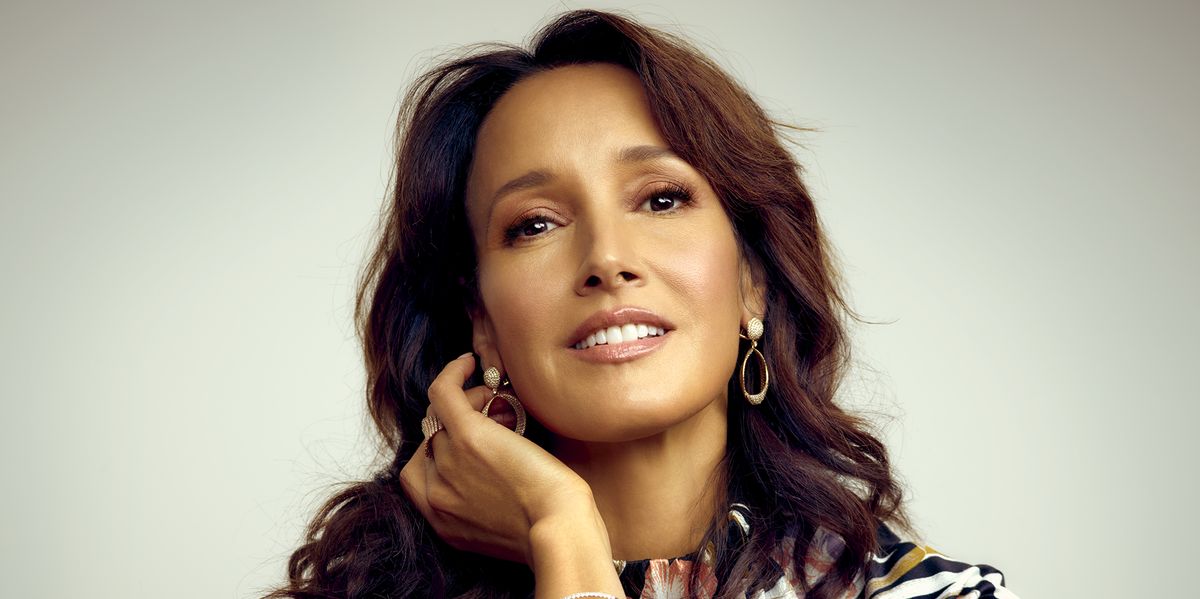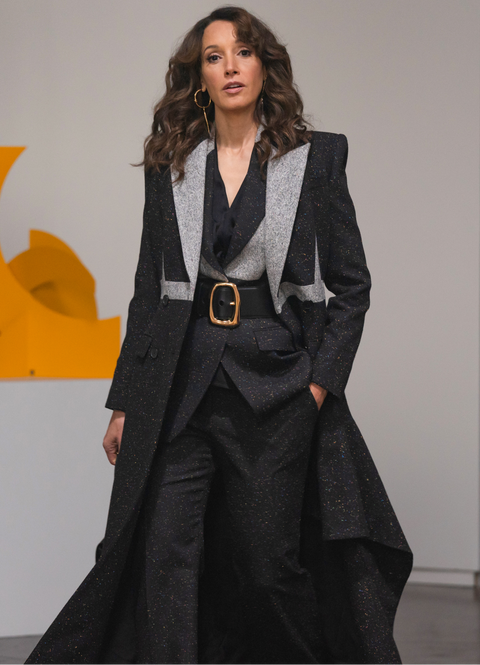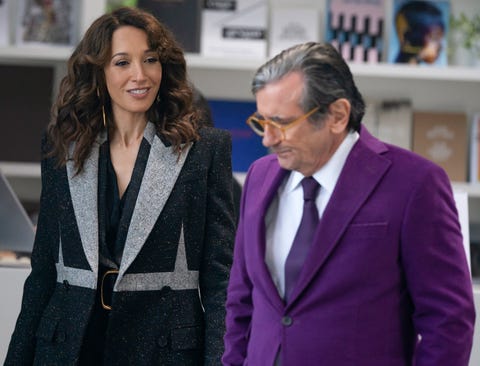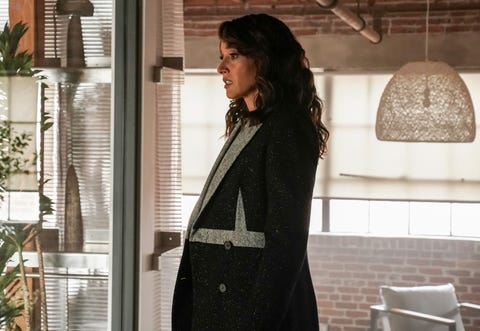Products You May Like
There are three types of L Word fans: people who identify with Bette Porter, people who want to be with Bette Porter, or people who are a bit of…both.
Jennifer Beals has been embodying the iconic power-lesbian character since the show first premiered in early 2004, and today she serves as an executive producer on the Showtime follow-up The L Word: Generation Q. During the past 17-plus years, Beals has seen Bette through several heartbreaks, breakups, and make-ups. She has ushered Bette through her life’s biggest changes: losing a parent, becoming a parent, marrying and divorcing the love of her life, losing her sister, a mayoral run, and raising a teenager. But one of Bette’s most enduring (and endearing) consistencies? She can put a man in his place faster than practically any other character onscreen.
It helps that The L Word writers provide the audience with men deserving of every sharp comeback Bette can launch their way. On any given day when the patriarchy is churning out more vitriol than usual, Google “Bette Porter scream” or “Bette Porter curse,” and you’ll find a suitably appropriate response.
The L Word: Gen Q’s second season, which premiered on August 8, delivers on more of the first’s classics. Episode one shows Bette negotiating her contract with the racist, sexist owner of a high-powered art gallery. Bette, who had previously left the art world to run for Los Angeles mayor in season 1 of Gen Q, is now back where she started: trying to make an exclusive, white industry less exclusive and less white.
This episode one negotiation scene between Bette and her new boss, Isaac Zakarian (Griffin Dunn) provides us with one classic Bette vs. the patriarchy line (“fucking asshole”). But it also speaks to something deeper: More than two million women have left the American workforce during the coronavirus pandemic, per Pew Research Center’s April 2021 report, and those who remain are faced with how to negotiate their value, their needs, and their safety in the pandemic’s wake. Even Bette, at top of her field, is prepared to hear “no” when she asks for what she wants. She comes into the situation with very specific asks for the artists she wants to represent but seems primed for a refusal. Plus, she’s well aware that Zakarian has a history of failing to give opportunities to people who don’t look like him. And, as we learn, she has reason to be skeptical: Zakarian only wants “marginalized artists” because he thinks they’re trendy.
And sure, Bette—who says in episode one that she wants a girlfriend with a “career”—isn’t always the model career woman. (Getting intimate with your TA, as Bette did in season 4 of the original series, is not necessarily at the top of the “professionalism 101” list.) But, despite her shortcomings, she stands with Leslie Knope and Olivia Pope as characters whose willingness to fight for what they need in the workplace makes them some of TV’s greatest icons.
Beals, who admits to having picked up a few tips from Bette over the years, has been working since she was a teenager. At 19, while a student at Yale, she was launched into stardom with 1983’s Flashdance. Since then, she’s learned to advocate for herself on film sets, in writers’ rooms, and in the producer’s chair. With that in mind, welcome to a new ELLE segment: “Porter Power Hour.” Below, advice from Bette—in Beals’s words—on how to be a badass in the boardroom and an ally to those who don’t have access to it.
Do your research, and know your value.
“It’s not just about advocating [for yourself],” Beals says. “The advocating has to come from a place of honesty and research and knowing your value, right? So the first part is kind of taking a look at where you are in your workplace. You can’t complain about where you are and do nothing about it. That’s the first thing. If you don’t like your situation at work, and you’ve done everything in your power to better your situation, then you need to move on. You need to have the courage—first of all—to move on, which is a little scary for some people.
“[Ask], ‘Where will I find the environment, or create the environment for myself where I will be valued and that I can further my own intentions of what I want to see in the world?’ The dream is big, and it has to include lots of people.”
Learn from your weaknesses. Work on them.
“It is probably a good idea to go to somebody whom you admire and whom you trust and have them give you an evaluation, and that’s part of your research when you go to advocate for yourself. ‘Here are what I think are my weaknesses and my strengths. Can you give me some feedback as to what you see [are] my weaknesses and my strengths?’
“Because it’s not just about the power woman and doing the starfish pose and the…you know what I’m talking about? The hands on the hips, the hands out?
“That [pose] raises your confidence and that’s great, but if you have the confidence without the wherewithal and the knowledge to do your job, then you will burn out. If somebody gives you that feedback: ‘Here’s what I think you could work on,’ be open about it. Take the time to get better at those things before you go and ask for that raise.”
Don’t take on too much.
“Really make sure that you are invaluable to that company or to that workspace, and that sometimes may mean you don’t take on every job. You make sure that you have a boundary, because if you keep taking on every job, and you don’t really have the time to do all of them well, then that’s not gonna bode well for you when you go to ask for a raise.”
Negotiate. Negotiate. Negotiate.
“Don’t be afraid to negotiate, but do your research before you go negotiate.”
Do as Beals says, not as Bette does.
“This is [coming from] Jennifer, not Bette. Bette would never say this. The universe will give you more energy if you include more people. That’s the Jennifer advice. From that place, then you get curious about other places where you may be valued and where you have room to grow, even if you have to take a pay cut.
“But if you find the place where you can grow, where you’re valued, or create the place where you can grow, where you’re valued, then all manner of things can happen. It requires self-knowledge—honest self-knowledge.”
“I think [research is] one thing Bette maybe could have done a little bit better that first negotiation [in season 2 of Gen Q]. She thinks she’s asking for so much, by saying ‘I wanna do this, this, this.’ But if she had been really good about negotiating, she would have gotten a rival gallery to engage with them so there would have been a bidding war.
“In a more perfect world, she would have gotten gallery B to give up their offer so that she could go to Zakarian and say, ‘This is what I want.’ Leveraging. You’re not just entitled to the raise because you’re confident. You’re entitled to the raise because you’re valuable.”
Advocate for yourself and others outside of the workplace, too.
Before we conclude Porter Power Hour, it’s important to note that Beals thinks if Bette would have won her 2020 mayoral race, she would have prioritized systems to support working L.A. moms who were made to be “the teacher, the mother, the UN negotiator, the expert tutor, or some IT expert” and the wage-earner at home during the pandemic. “The first thing, yes, is looking at childcare and paid leave,” she adds.
Anyone else pulling out their Autostraddle.com Bette Porter for President T-shirt after reading that?
“There’s different ways to go about politics,” Beals says. “There’s different ways to go about changing culture, changing policy. To get meta, The L Word takes us from sort of a hetero-centric focus and gaze to an LGBTQ-centric world. That in and of itself is political in many ways.” As part of her own continued activism, Beals is currently raffling photos she took on the Gen Q set as part of a fundraiser for LGBTQ+ youth organization GLSEN.
“I think that Bette knows that, by working in the art world, especially in this day and age, it’s time to take our gaze away from a white privilege kind of world to looking at the African American experience,” Beals says. “By doing that, you can create change.”
In the years since The L Word first premiered, Bette has leveled up from Bette Porter, champion of “Provocations”—an extremely controversial art show depicting nude men in bondage—to Bette Porter, strong advocate of BIPOC artists who have never gotten their due or been allowed to showcase Black joy instead of trauma. Now that she and those power suits are back in the world’s most prestigious galleries, there’s no stopping Bette’s patented “Big Top Energy.”
Now, go out there and harness some of your own. But maybe leave the cursing and screaming at home.
This content is created and maintained by a third party, and imported onto this page to help users provide their email addresses. You may be able to find more information about this and similar content at piano.io



